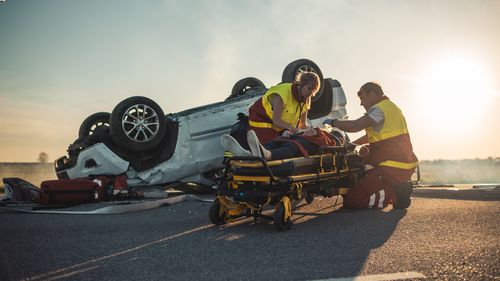- Catastrophic Injury
Leslie has over 3 decades of civil litigation and trial experience for personal injury and family law. She is a member of the State Bar of Georgia litigation and family law sections.
Understanding Catastrophic Injury Claims in Georgia
A catastrophic injury changes everything. It can leave a person with permanent disabilities, overwhelming medical bills, and the inability to return to work. In Georgia, the law treats these cases with special attention because the impact is so severe.
In this blog, you’ll learn what qualifies as a catastrophic injury under Georgia law, the most common causes, what makes these cases different from other personal injury claims, and how working with an experienced Fayetteville personal injury attorney can help you pursue the full compensation you deserve.
What Is a Catastrophic Injury Under Georgia Law?
A catastrophic injury claim involves long-term or permanent damage that significantly affects a person’s daily life. Georgia law provides specific guidelines for what qualifies as a catastrophic injury.
Georgia’s Legal Definition of Catastrophic Injury
In Georgia, a catastrophic injury is defined under O.C.G.A. § 34-9-200.1(g). This statute outlines injuries that prevent an individual from performing their prior work or any gainful employment. Although this statute originates from Georgia’s workers’ compensation system, it helps inform personal injury cases involving catastrophic injuries.
Catastrophic injuries typically lead to a permanent disability or severe loss of physical or mental function. These injuries require extensive medical treatment, long-term care, or lifelong adjustments to a person’s lifestyle.
Common Types of Catastrophic Injuries
Certain injuries are more likely to be classified as catastrophic in a personal injury claim. These include:
- Spinal cord injuries resulting in paralysis or severe mobility loss
- Traumatic brain injuries with long-term cognitive or emotional effects
- Severe burns that cause permanent scarring or disfigurement
- Amputations or crushed limbs needing prosthetics or surgeries
- Severe orthopedic injuries leading to chronic pain or functional loss
Each of these examples often requires ongoing rehabilitation, medical care, and physical therapy. In many cases, the injured person may never return to their previous level of independence or employment.
Impact on Daily Life and Earning Capacity
A catastrophic injury limits basic activities such as walking, speaking, or personal care. These injuries also reduce or eliminate a person’s earning capacity, leading to lasting financial hardship. The injured party may need to depend on life care planners, medical professionals, and assistive devices.
In personal injury cases, this often leads to a catastrophic injury lawsuit to recover compensation for medical expenses, lost wages, and non-economic damages such as emotional distress and pain and suffering.
The Role of Medical Records and Expert Testimony
To prove a catastrophic personal injury claim in Georgia, strong documentation is required. Medical records, accident reports, and expert evaluations are used to show the extent of the injury and its long-term effects. Testimony from doctors and specialists supports the claim for future medical costs and ongoing medical care.
Most Common Causes of Catastrophic Injuries in Georgia
A catastrophic injury claim often begins with an accident caused by someone else’s negligence. In Georgia, several types of incidents frequently lead to catastrophic injuries.
Motor Vehicle Collisions
Car accidents, motorcycle accidents, and truck crashes are leading causes of catastrophic injury claims in Georgia. These incidents can result in spinal cord injuries, traumatic brain injuries, and permanent disability. Victims often face severe pain, emotional trauma, and a need for ongoing medical care. Insurance companies may resist paying full compensation, which makes legal representation essential.
Workplace Accidents and Construction Injuries
Construction accidents and other workplace incidents often involve falls, machinery accidents, or being struck by heavy objects. These events may cause amputations, head injuries, or spinal cord damage. Georgia law allows injured workers to file for compensation, and in some cases, pursue a personal injury lawsuit when a third party is responsible.
Medical Malpractice
Surgical errors, anesthesia mistakes, and misdiagnosis can lead to catastrophic outcomes. Medical malpractice may cause permanent brain damage, loss of organ function, or severe physical impairment. These cases often involve complex medical records and require expert testimony to prove fault and the extent of harm.
Serious Slip and Fall Accidents
While many slip and fall injuries are minor, some lead to life-altering consequences. A fall from a height or onto a hard surface can cause head injuries, spinal cord injuries, or multiple fractures. When property owners fail to maintain safe conditions, they may be held liable for the resulting catastrophic injury.
Sports and Recreational Injuries
High-impact sports and recreational activities can lead to severe injuries. Head trauma, broken bones, and spinal cord injuries are common in contact sports or high-speed activities. If the injury was caused by defective equipment or negligence, a catastrophic injury lawsuit may be possible.
Acts of Violence or Criminal Negligence
Intentional harm or reckless behavior can lead to catastrophic personal injury claims. Gunshot wounds, assault, and other violent actions often result in permanent scarring, paralysis, or emotional distress. Victims may be entitled to recover compensation for both physical and emotional suffering.
Why Catastrophic Injury Claims Require Specialized Legal Strategy
Catastrophic injury claims involve high damages, long-term care, and permanent life changes. These cases need a focused legal approach backed by experience and preparation.
Higher Stakes and More Complex Damages
Catastrophic injury cases often involve lifelong medical care, future expenses, and significant non-economic damages like pain and suffering. The financial recovery must cover everything from physical therapy and medical treatments to emotional trauma and loss of earning capacity. A standard personal injury claim strategy is not enough.
Expert Testimony and Medical Documentation
A catastrophic injury claim requires strong evidence. This includes detailed medical records, imaging results, accident reports, and statements from treating physicians. Expert witnesses such as neurologists, orthopedic surgeons, and life care planners help prove the full extent of injuries and future medical needs. These reports guide the calculation of compensation and show how the injury affects the victim’s daily life.
Dealing with Insurance Companies
Insurance companies often fight catastrophic injury claims aggressively. They may downplay the seriousness of the injury or dispute the value of ongoing medical care. A Fayetteville personal injury lawyer understands these tactics and works to secure a fair settlement. Legal representation ensures the injured person is not pressured into accepting less than the case is worth.
Long-Term Impact on Life and Work
Catastrophic injuries often prevent the injured person from returning to work or performing everyday tasks. This loss of function must be shown clearly in the claim. Calculating lost wages and reduced earning capacity is a key part of the legal strategy. A catastrophic injury lawyer uses vocational experts to assess how the injury affects future employment and income.
Trial Preparation and Settlement Leverage
Many catastrophic injury cases go to trial because the damages are too large for a quick settlement. A legal team must prepare every case as if it will go to court. This includes filing motions, preparing expert reports, and building a case timeline. A strong trial strategy often leads to better settlement offers because the insurance company sees the case is ready for court.
Key Elements in Building a Strong Catastrophic Injury Lawsuit
A successful catastrophic injury claim must be supported by solid evidence, clear documentation, and a strong legal strategy from the beginning.
Proving Negligence
Every catastrophic injury lawsuit starts with proving negligence. This means showing that another person or company caused the injury by failing to act responsibly. The injured person must show that there was a duty of care, that the duty was breached, and that the breach caused the injury. A Fayetteville personal injury attorney will gather evidence such as accident reports, eyewitness accounts, and surveillance footage to support this.
Documenting the Full Extent of the Injury
Catastrophic injuries often involve spinal cord damage, traumatic brain injuries, or severe burns. These injuries must be well documented. Medical records, treatment plans, surgical reports, and imaging results help show the seriousness of the injury. Doctors and medical professionals may provide written evaluations explaining the long-term effects on the injured person’s health and ability to function.
Calculating Economic and Non-Economic Damages
The injured person must show the financial impact of the injury. This includes medical bills, lost wages, and future expenses. Non-economic damages such as pain and suffering, emotional distress, and loss of quality of life must also be included. Expert witnesses may estimate the cost of future medical care and the loss of future earning capacity. This evidence supports a fair settlement or court award.
Using Expert Witnesses
In a catastrophic personal injury claim, expert testimony is often required. Life care planners, vocational experts, and medical specialists help explain the long-term effects of the injury. Their reports are used to show what kind of care the injured person will need, what that care will cost, and how the injury will affect work and daily activities.
Preparing for Trial if Needed
Many catastrophic injury cases do not settle quickly. Insurance companies often fight large claims. A strong legal team must be ready to take the case to trial. This includes filing court documents, preparing witnesses, and presenting evidence clearly. A Fayetteville personal injury lawyer with trial experience can pressure the insurance company into offering a fair settlement.
Contact an Experienced Fayetteville Personal Injury Lawyer Today!
If you or a loved one has suffered a catastrophic injury, contact our team at Wade Law. Our Fayetteville personal injury attorneys are ready to review your case, explain your legal options, and fight for the compensation you need to move forward.
Contact us at 770-282-1188 for a free case consultation today!










